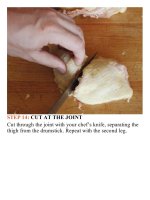The food lab better home cooking through science ( PDFDrive ) 107
Bạn đang xem bản rút gọn của tài liệu. Xem và tải ngay bản đầy đủ của tài liệu tại đây (245.04 KB, 2 trang )
HEATANDEGGS
Though some people claim that adding salt, vinegar, or
bakingsodatothewaterwhenyouboilaneggcanaffectits
finaltexture,inmytesting,Ifoundthattheonlyfactorsthat
matter when boiling an egg in its shell aretime and
temperature.
To find out exactly how fast an egg cooks in boiling
water, I cooked a dozen and a half eggs, removing them
from the pot at 30-second intervals before splitting them
open.
Now, there are a few things you’ll notice immediately.
Firstandmostobviousisthatthelongeryoukeepaneggin
boiling water, the hotter it gets. But here’s something more
important,whichmayseemtrivialatfirst,yet,aswe’llsee,
is instrumental in a perfectly cooked egg: foods in a hot
environment cook from the outside in, and the bigger the
temperature differential between the food and the
environment,themoreuneventhecookingwillbe.
What this means is that if you lower an egg into boiling
water, it’s possible to achieve an end result with a white
that’stough,rubbery,andovercookedwhiletheyolkisstill
justbarelycookedinthecenter,likethisone:
So, what’s the ideal temperature to cook an egg to?
Here’swhathappenstoaneggwhiteasitheatsup:
• From 30° to 140°F:As the white gets hot, its proteins,









